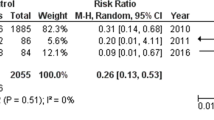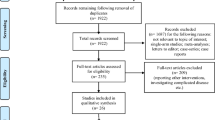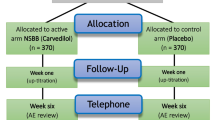Abstract
Forty consecutive patients affected by recurrent attacks of symptomatic uncomplicated diverticular disease of the colon were evaluated to investigate the effectiveness of 2 different mesalazine therapeutic schedules in preventing recurrence of the disease. The patients were randomly enrolled and treated with mesalazine 1.6 g/d (group A) or mesalazine 1.6 g/d 10 days per month (group B). Thirty-four patients completed the study (85%): 3 (7.5%, 1 in group A and 2 in group B) were lost to follow-up, 2 (5%, both group B) were withdrawn from the study for protocol violation, and 1 (2.5%) for hospital admission for stroke (group A). Twenty-three patients (67.65%) were symptom free after 24 months of treatment (overall symptomatic score, 0): 14 of 18 in group A (per-protocol, 77.78%; intention to treat, 70% [95% confidence interval [CI], 61.5–91.8]), 9 of 16 in group B (per protocol, 56.25%; intention to treat, 45% [95% CI, 61.5–91.8]; P < 0.05). Four patients (10%) improved, but were not completely symptom free. Six patients (15%) showed recurrence of symptoms: 1 in group A (5.56%) and 5 in group B (31.25%; P < 0.005; overall symptomatic score, 68). Daily mesalazine supplying seems to be more effective than cyclic supplying in maintaining remission in recurrent symptomatic uncomplicated diverticular disease.




Similar content being viewed by others
References
West AB, Losada M (2004) The pathology of diverticulosis coli. J Clin Gastroenterol 38(Suppl 1):S11–S16
Tursi A (2004) Acute diverticulitis of the colon—current medical therapeutic management. Expert Opin Pharmacother 5:145–149
Tursi A, Brandimarte G, Daffinà R (2002) Long-term treatment with mesalazine and rifaximin versus rifaximin alone for the patients with recurrent attacks of acute diverticulitis of the colon. Dig Liver Dis 34:510–515
Brandimarte G, Tursi A (2004) Rifaximin plus mesalazine followed by mesalazine alone is highly effective in obtaining remission of symptomatic uncomplicated diverticular disease. Med Sci Monit 10:170–173
Tursi A, Brandimarte G, Giorgetti GM, Elisei W (2006) Mesalazine and/or Lactobacillus casei in preventing recurrence of symptomatic uncomplicated diverticular disease of the colon: a prospective, randomised, open-label study. J Clin Gastroenterol 40:312–316
DiMario F, Aragona G, Leandro G, Comparato G, Fanigliulo G, Cavallaro G, Cavestro GM, Iori V, Maino M, Moussa AM, Gnocchi A, Mazzocchi G, Franzé A (2005) Efficacy of Mesalazine in the Treatment of Symptomatic Diverticular Disease. Dig Dis Sci 50:581–586
Results of a Consensus Development Conference (1999) Diagnosis and treatment of diverticular disease. Surg Endosc 13:430–436
Latella G, Pimpo MT, Sottili S, Zippi M, Viscido A, Chiaramonte M, Frieri G (2003) Rifaximin improves symptoms of acquired uncomplicated diverticular disease of the colon. Int J Colorectal Dis 18:55–62
Grisham MB (2004) Oxidants and free radicals in inflammatory bowel disease. Lancet 344:859–861
Wood AJJ (1996) Inflammatory bowel disease. N Engl J Med 334:841–848
Gonçalves E, Almeida LM, Dinis TC (1998) Antioxidant activity of 5-aminosalicylic acid against peroxidation of phosphatidylcholine liposomes in the presence of alpha-tocopherol: a synergistic interaction? Free Rad Res 29:53–66
Comparato G, Fanigliulo L, Cavallaro LG, Aragona G, Cavestro GM, Liatopoulou S, Carloni C, Nervi G, Muzzetto P, Iori V, Maino M, Franzè A, Di Mario F (2006) Quality of life in uncomplicated diverticular disease: Is it another good reason for the treatment? Dig Liver Dis 38(Suppl 1):S178
Floch MH, Bina I (2004) The natural history of diverticulitis: fact and theory. J Clin Gastroenterol 38(Suppl 5):S2–7
Author information
Authors and Affiliations
Corresponding author
Rights and permissions
About this article
Cite this article
Tursi, A., Brandimarte, G., Giorgetti, G.M. et al. Continuous Versus Cyclic Mesalazine Therapy for Patients Affected by Recurrent Symptomatic Uncomplicated Diverticular Disease of the Colon. Dig Dis Sci 52, 671–674 (2007). https://doi.org/10.1007/s10620-006-9551-0
Received:
Accepted:
Published:
Issue Date:
DOI: https://doi.org/10.1007/s10620-006-9551-0




